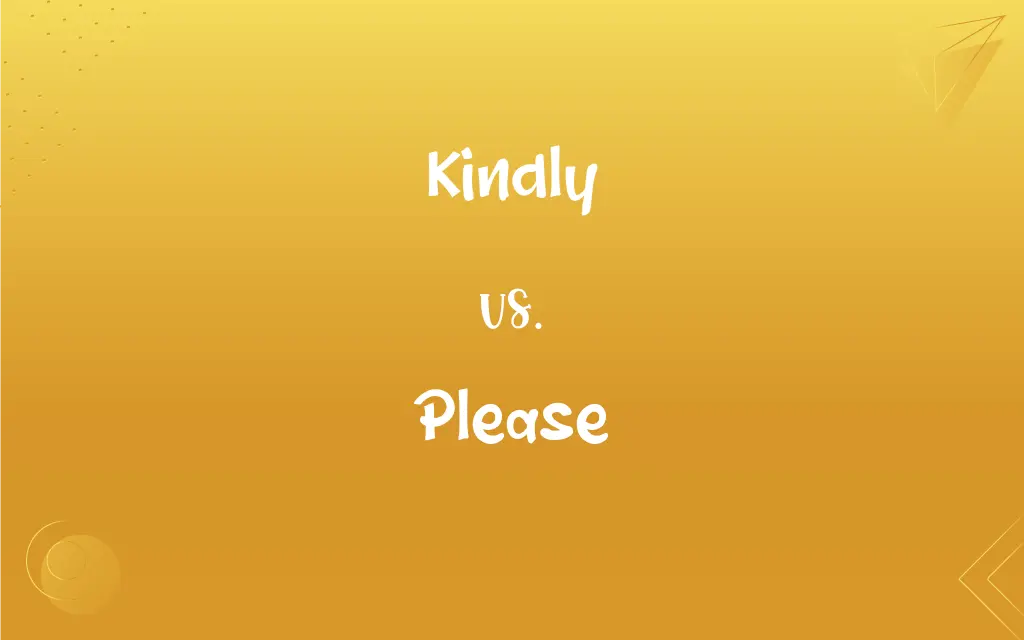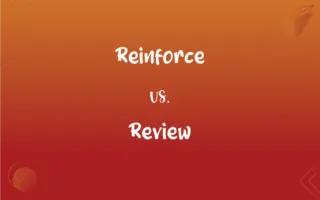Kindly vs. Please: What's the Difference?
Edited by Aimie Carlson || By Harlon Moss || Published on January 5, 2024
"Kindly" often conveys a polite request or a gentle command, while "please" is used to politely ask for something or make a request more courteous.

Key Differences
"Kindly" is a term that implies a polite or gentle tone, often used in formal or professional contexts to soften a request or command. It can suggest a touch of authority or expectation of compliance. "Please," on the other hand, is a more universal term for politeness, used across various contexts to make a request sound more courteous and less demanding. It doesn't inherently carry an authoritative tone.
In usage, "kindly" can sometimes be perceived as slightly old-fashioned or overly formal, especially in casual conversations. It's more common in written requests or formal verbal communication. "Please," conversely, is versatile and widely accepted in both spoken and written language, from casual chats to official documents, without sounding outdated or overly formal.
The placement of "kindly" in a sentence is usually at the beginning, setting a formal tone right away. For example, "Kindly submit the report by tomorrow." In contrast, "please" can be more flexible in placement, either at the beginning, middle, or end of a request, such as "Please call me," "Call me, please," or "Could you call me, please?"
When it comes to connotation, "kindly" can sometimes unintentionally come across as patronizing or authoritative in casual contexts, whereas "please" is generally more neutral and widely accepted as a sincere form of politeness. Therefore, the choice between these two words can significantly impact the tone and perception of a request.
Comparison Chart
Tone
Formal, sometimes authoritative
Universally polite, neutral
ADVERTISEMENT
Usage Context
More common in formal or written communication
Used in both casual and formal situations
Sentence Placement
Often at the beginning of a sentence
Flexible, can be used anywhere in a sentence
Perception
Can be seen as old-fashioned or patronizing
Generally seen as sincerely polite
Flexibility in Language
Less versatile, specific to requests/commands
Highly versatile, used in requests and offers
Kindly and Please Definitions
Kindly
Used to politely ask for something.
Kindly refrain from smoking in this area.
ADVERTISEMENT
Please
A polite addition to requests or commands.
Could you please lower the volume?
Kindly
In a kind-hearted manner.
He spoke kindly to the children.
Please
Used to express politeness in a request.
Please pass the salt.
Kindly
Exhibiting a gentle, caring nature.
She kindly offered her seat to the elderly man.
Please
Indicating one's desire or preference.
Do whatever you please.
Kindly
Used to soften a command or instruction.
Kindly ensure all doors are locked before leaving.
Please
To be agreeable or gratifying.
The outcome pleased everyone involved.
Kindly
Reflecting a benevolent or warm-hearted temperament.
The nurse kindly attended to the patients.
Please
To cause enjoyment or satisfaction.
This music really pleases me.
Kindly
Of a sympathetic, helpful, or benevolent nature
A kindly interest.
A gentle, kindly soul.
Please
To give enjoyment, pleasure, or satisfaction to; make glad or contented.
Please
To be the will or desire of
May it please the court to admit this firearm as evidence.
FAQs
Does "kindly" imply a command?
It can, especially if used in a formal or authoritative context.
Can "kindly" sound patronizing?
In casual contexts, it might come across as patronizing.
Can "please" be used in formal emails?
Yes, "please" is appropriate for formal emails.
Is "kindly" appropriate in casual conversation?
It can be used, but it may sound overly formal.
Is "please" acceptable in professional settings?
Yes, "please" is suitable for professional settings.
Is "kindly" formal?
Yes, "kindly" is often used in formal contexts.
Is "please" versatile in sentence placement?
Yes, "please" can be placed flexibly within a sentence.
Can "please" be used to show sincere politeness?
Absolutely, "please" is commonly used to express sincere politeness.
Do "kindly" and "please" have the same level of politeness?
They both convey politeness, but "please" is more universally accepted.
Can "please" be used in legal documents?
Yes, though its usage might be limited.
Does "kindly" come across as old-fashioned?
It can be perceived as old-fashioned in some contexts.
Is "please" a universally polite word?
Yes, it's universally recognized as a polite term.
Can "kindly" be replaced by "please" in formal requests?
Yes, "please" can be a suitable replacement for "kindly" in formal requests.
Does "please" work in both spoken and written language?
Absolutely, it's effective in both forms.
Can "kindly" be seen as demanding?
In certain contexts, it might come across as slightly demanding.
Is "please" considered polite in all cultures?
While widely regarded as polite, cultural interpretations can vary.
Should "kindly" be avoided in informal texts?
It's not necessary to avoid it, but it might sound too formal.
Is "kindly" more authoritative than "please"?
In some contexts, "kindly" can sound more authoritative.
Is "kindly" suitable for customer service communication?
Yes, especially in formal written requests.
Can "please" be used in commands?
Yes, but it softens the tone of the command.
About Author
Written by
Harlon MossHarlon is a seasoned quality moderator and accomplished content writer for Difference Wiki. An alumnus of the prestigious University of California, he earned his degree in Computer Science. Leveraging his academic background, Harlon brings a meticulous and informed perspective to his work, ensuring content accuracy and excellence.
Edited by
Aimie CarlsonAimie Carlson, holding a master's degree in English literature, is a fervent English language enthusiast. She lends her writing talents to Difference Wiki, a prominent website that specializes in comparisons, offering readers insightful analyses that both captivate and inform.































































